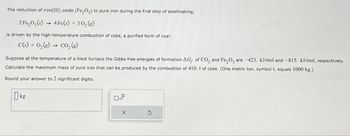
Chemistry
10th Edition
ISBN: 9781305957404
Author: Steven S. Zumdahl, Susan A. Zumdahl, Donald J. DeCoste
Publisher: Cengage Learning
expand_more
expand_more
format_list_bulleted
Question
Please correct answer and don't use hand rating

Transcribed Image Text:The reduction of iron(III) oxide (Fe2O3) to pure iron during the first step of steelmaking,
2 Fe₂O,(s)
4 Fe(s) + 302(g)
is driven by the high-temperature combustion of coke, a purified form of coal:
C(s) + 0,(e) co,(s)
O2(g)
Suppose at the temperature of a blast furnace the Gibbs free energies of formation AG, of CO2 and Fe2O3 are -423. kJ/mol and -815. kJ/mol, respectively.
Calculate the maximum mass of pure iron that can be produced by the combustion of 410. t of coke. (One metric ton, symbol t, equals 1000 kg.)
Round your answer to 2 significant digits.
kg
Expert Solution
This question has been solved!
Explore an expertly crafted, step-by-step solution for a thorough understanding of key concepts.
Step by stepSolved in 2 steps

Knowledge Booster
Similar questions
- help please answer in text form with proper workings and explanation for each and every part and steps with concept and introduction no AI no copy paste remember answer must be in proper format with all workingarrow_forwardWhen using eucalyptus essential oil on children, it should be: (Select all that apply.) Choose at least one answer. a. used only on the chest b. kept away from the face c. kept away from the soles of the feet d. dilutedarrow_forwardShe Provided Us With The Answer But I Dont Know How To Get The Answerarrow_forward
- For what purpose Biuret test is used?arrow_forward[References] 1 pt b. Balanced formula equation: 1 pt HCHO2(aq) + KOH(aq) 1 pt 1 pt Complete ionic equation: 1 pt 1 pt 1pt 1 pt Net ionic equation: 1 pt 1 pt 1 pt c Balanced formula eqmation: 92) e element +. +.arrow_forward1.) LIAIH(O'Bu)3 2) CH2 a) b.) 1.) c) 1.) 2) 2) R. d) 1.) e) 1.) R. R 2) 2) R"abbreviation for answers 2)arrow_forward
- Dr. Josh Axe states that frankincense oil has the following properties: (Select all that apply.) Choose at least one answer. a. hair thickener b. conducive to meditation c. anti-inflammatory d. good for digestionarrow_forwardSelect the best answer. .CI 1.) LIAIH(O'Bu)3 2) ( Ph-P-CH2 3 a) 1.) b.) 1.) c.) 1.) R 2) 2) H 2) e) 1.) d.) 1.) 2) O. 2)arrow_forwardUse the Rings menu to draw cyclobutane, a four carbon ring. Select Draw Rings More Erase Harrow_forward
- Part C Li + then H₂O+ quencharrow_forwardQuality control material in the hematology laboratory is best described as: Question 3 options: A) a stable material used to establish the accuracy of an automated method and normal curve B) a stable material used to monitor the functioning of an analyzer or the performance of a process C) reagents used to perform preventative maintenance D) materials tested to develop a normal reference rangearrow_forwardINSTRUCTIONS 1. Please enumerate all given values. 2. Identify all unknown values 3. Write the formula first before substituting the values. 4. Enclose final answers in boxes. 5. Do not round off immediately. Consider the whole value during computations. 6. Round off final answers to 2 DECIMAL PLACES ONLY. Problem: What volume (mL) sulfuric acid solution (98.0% of the concentrated sulfuric acid by weight; density 1.84 g/mL) and the volume of water are used in the preparation of 2.00 L of a 4.00 N solution?arrow_forward
arrow_back_ios
SEE MORE QUESTIONS
arrow_forward_ios
Recommended textbooks for you
 ChemistryChemistryISBN:9781305957404Author:Steven S. Zumdahl, Susan A. Zumdahl, Donald J. DeCostePublisher:Cengage Learning
ChemistryChemistryISBN:9781305957404Author:Steven S. Zumdahl, Susan A. Zumdahl, Donald J. DeCostePublisher:Cengage Learning ChemistryChemistryISBN:9781259911156Author:Raymond Chang Dr., Jason Overby ProfessorPublisher:McGraw-Hill Education
ChemistryChemistryISBN:9781259911156Author:Raymond Chang Dr., Jason Overby ProfessorPublisher:McGraw-Hill Education Principles of Instrumental AnalysisChemistryISBN:9781305577213Author:Douglas A. Skoog, F. James Holler, Stanley R. CrouchPublisher:Cengage Learning
Principles of Instrumental AnalysisChemistryISBN:9781305577213Author:Douglas A. Skoog, F. James Holler, Stanley R. CrouchPublisher:Cengage Learning Organic ChemistryChemistryISBN:9780078021558Author:Janice Gorzynski Smith Dr.Publisher:McGraw-Hill Education
Organic ChemistryChemistryISBN:9780078021558Author:Janice Gorzynski Smith Dr.Publisher:McGraw-Hill Education Chemistry: Principles and ReactionsChemistryISBN:9781305079373Author:William L. Masterton, Cecile N. HurleyPublisher:Cengage Learning
Chemistry: Principles and ReactionsChemistryISBN:9781305079373Author:William L. Masterton, Cecile N. HurleyPublisher:Cengage Learning Elementary Principles of Chemical Processes, Bind...ChemistryISBN:9781118431221Author:Richard M. Felder, Ronald W. Rousseau, Lisa G. BullardPublisher:WILEY
Elementary Principles of Chemical Processes, Bind...ChemistryISBN:9781118431221Author:Richard M. Felder, Ronald W. Rousseau, Lisa G. BullardPublisher:WILEY

Chemistry
Chemistry
ISBN:9781305957404
Author:Steven S. Zumdahl, Susan A. Zumdahl, Donald J. DeCoste
Publisher:Cengage Learning

Chemistry
Chemistry
ISBN:9781259911156
Author:Raymond Chang Dr., Jason Overby Professor
Publisher:McGraw-Hill Education

Principles of Instrumental Analysis
Chemistry
ISBN:9781305577213
Author:Douglas A. Skoog, F. James Holler, Stanley R. Crouch
Publisher:Cengage Learning

Organic Chemistry
Chemistry
ISBN:9780078021558
Author:Janice Gorzynski Smith Dr.
Publisher:McGraw-Hill Education

Chemistry: Principles and Reactions
Chemistry
ISBN:9781305079373
Author:William L. Masterton, Cecile N. Hurley
Publisher:Cengage Learning

Elementary Principles of Chemical Processes, Bind...
Chemistry
ISBN:9781118431221
Author:Richard M. Felder, Ronald W. Rousseau, Lisa G. Bullard
Publisher:WILEY